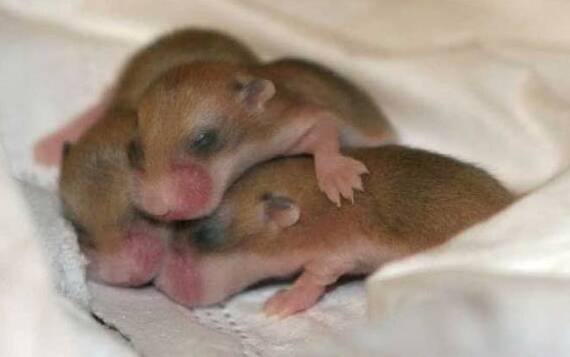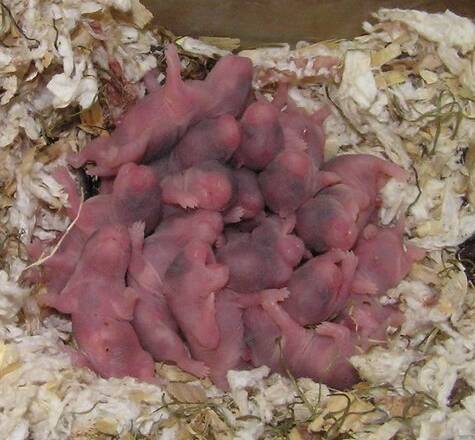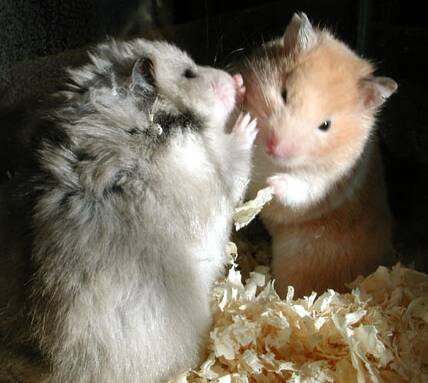
Hamsters are funny fluffy creatures that make almost everyone feel affectionate. The news that your female is waiting for a replenishment evokes a variety of feelings. It can be a delight, or it can be fear of problem situations.
The only moment that shocks all hamster lovers is when your cute fluffy lump can eat its own babies. What is the reason for this behavior? Let’s figure it out. Find out why this happens and how to prevent cannibalism in your hamsters.
Why do hamsters eat their babies
Age
According to statistics, females under 2 months of age most often devour cubs. Although a hamster can become pregnant at 1 month, her hormonal background has not yet been formed. By the time of birth, the female does not feel the need to take care of the offspring and destroys the offspring. To prevent cannibalism, animals should be bred from 4 months of age and older.
Especially often trouble happens if the female was bought at a pet store, already being in position. A change of environment is very stressful for the hamster and affects behavior.
Unhealthy offspring

If the babies were born with some kind of genetic deformities, defects, the mother will instinctively get rid of them. Sick or weak kids will be eaten. Inadequate offspring are often born as a result of inbreeding – incest when animals from the same littermate. Sometimes the female does not kill herself but eats the cubs that have died for any reason.
Numerous offspring
Excessive attention from owners
Close attention, excessive custody will harm not only human relations but can also cause cannibalism in female hamsters. Since this rodent is a lonely animal, and after the appearance of the cubs, a secluded environment and tranquility is needed by the female, even more, excessive care will only harm these animals. Do not take the hamster in your arms, climb into the cageless. Let the family see you less.
Hamster cannibalism: why do hamsters eat their cubs and each other?
Alien odors repel the hamster mom. Feeling a foreign smell, she does not identify the cubs as her own creatures and, as a result, abandons them and destroys them. Don’t touch the hamster family within one to two weeks after the babies are born!
For the new offspring of fluffy rodents, you need to prepare in advance. While cleaning the cage, if you find hamster supplies, do not touch them. This is a strategic supply of food, which unpleasantly traumatizes the psyche of the animal, in the event of its loss, up to an uneven breakdown in a pregnant female. Only spoiled food can be thrown away to avoid the growth of putrefactive bacteria, odor and poisoning.
For self-arrangement of the nest, it is recommended to put a few paper napkins. Your task is to fill the drinking bowl with clean drinking water and put food in the feeding trough on time. This is the only thing the rodent needs from the owner at this time. The rest will be done by nature.
Possible Reasons for Hamster Eating Cubs
Offspring with health problems
In the wild, in order for the entire viable hamster genus to survive, weak offspring are destroyed, which will prevent rodents from escaping danger.
Domestic hamsters, which have long been tamed by humans, remain loyal to the centuries-old natural instincts that have saved them in the wild for a long time.
Born sick and weak, hamsters are usually eaten by their mothers. Injuries suffered by hamsters before or after childbirth equally make newborn babies weak and immediately become unviable. Such cubs, with almost one hundred percent probability, will be destroyed.
Important! Noticing a sick or even a dead hamster in the cage, do not remove it, the female decides what to do with it. Your unnecessary intervention can cause the death of all remaining offspring.
This is due to foreign odors. Not smelling her scent, the mother can start to panic and kill the rest of the newborn hamsters. Don’t worry, these rodents eat everything, including meat. As shocking as it may sound, the female herself will “clean up” in her nest.
If this does not happen within a few days, then use gloves to remove the deceased cub. This will somehow protect other hamsters from your smell.
Unwillingness to become a mom
Often, the first pregnancy in a female hamster can cause severe anxiety, anxiety and drive the young mother into a stressful situation.
Unpreparedness for maternal responsibilities can be another reason for cannibalism in hamsters.
The female is not ready either for pregnancy or for giving birth and taking care of her babies. This reason can provoke the killing of offspring unnecessary for her. The next bearing of offspring and their birth usually does not cause such a reaction in the female.
Weight of cubs
There are many or seemingly large numbers of newborn babies. Having become a mom for the first time, doubts prevail over both people and animals. Can I ask if I have enough milk? Your female, very little herself endured, gave birth. Lost a lot of energy and vitality. And here numerous newborn offspring squeak and ask for food nearby. The hamster may panic and think that she will not feed everyone, and it will be difficult to cope with such a horde of babies. Therefore, this is where the natural instinct is triggered, several individuals of the offspring can be eaten.
In order not to provoke such a situation, the owner needs to improve living conditions and maximize the hamster’s nutrition. She now needs nutrients and minerals, as well as vitamins. Feed her special food for pregnant females, vegetables, and fruits. Don’t forget about clean water.
The female has 8 nipples, she can feed 8-12 cubs, but if 16-18 of them were born, there is a high probability that the mother will bite the “extra” ones. In this case, “partial cannibalism” is observed – from time to time the female eats one or more babies, and the rest continues to feed, and they survive.
This situation is typical for multiple Syrians. The destruction of hamsters begins in the first days after giving birth and ends as soon as the cubs learn to eat adult food.
The health of the female
Childbirth and lactation is serious test for the rodent’s body. Cubs grow incredibly quickly both in the womb and after birth. If the mother’s nutrition was insufficient, her body after childbirth is on the verge of exhaustion. Such a female will not be able to feed the babies, and in order to survive, she can eat her children.
Any health problems, poor conditions of detention provoke such a development of events. If the female does not have enough water, food, or space in the cage, she will not raise offspring.
Human intervention
If there is a foreign smell on the cubs, the female will kill them. This is related to the ban on taking babies in the arms in the first week after childbirth. Given the nervousness of these rodents, you should stop sticking your hands in the cage a few days before the birth of the cubs. Hamsters eat offspring when they sense the presence of strangers, that is, danger.
During the breeding season, even a familiar and beloved owner is regarded as a stranger.

The presence of relatives
Both Dzungarian and Syrian hamsters are loners by nature. The presence of a male in the cage makes both animals nervous. The female becomes nervous and aggressive. She can first bite the male, then the cubs, ready for anything, just to remain the sole owner of the territory.
Sometimes the father of the hamster will eat his children. The female exhausted by childbirth cannot prevent him, and often does not even try.
Stress, fear
Any emotional shock of a pregnant or lactating female poses a threat to the offspring. The repair started with the sounds of a punch, moving. You just need to get the hamster out of the house or let the cat close to the cage.
Why do hamsters eat each other
Cannibalism among hamsters is not always associated with the birth of helpless babies. These rodents fiercely defend their territory from congeners and other competitors. In nature, a slain enemy is a valuable source of protein food. Another reason: a dead animal must be disposed of so as not to attract predators. In the wild, the loser has the opportunity to flee, in the cage – not.
Proven fact: hamsters eat their own kind and, on occasion, other smaller rodents.
Hamsters must be kept separate, otherwise, they will fight among themselves. Gender does not matter. The owner may be unaware of the enmity for quite a long time, because fights take place late at night, and the animals sleep during the day. If one of the rivals manages to gain the upper hand, the other hamster will mysteriously disappear. The hamster may not be able to eat an entire adult animal, or it may not have enough time. But the situation when the hamster ate the hamster is not an out-of-the-ordinary event. They do not gnaw at each other because they lack food. Hamsters eat a corpse not so much from hunger as guided by instincts. At home, the owner usually finds bloody remains, bones, or a gnawed head of one of the hamsters in the morning.
Conclusion
People are confused by the appearance of rodents in the hamster family. They seem to be the embodiment of harmlessness, touch, and amusement with their habits. Man ceases to associate “fluffy” with wild nature and its harsh laws.
Most often, hamsters eat their cubs through the owner’s fault. Cannibalism occurs among them and at large, but much less often. Compliance with a number of rules when breeding these rodents will prevent such an unpleasant development of events. The owner must decide – why does he need a litter, and not to take hamsters for fun.
Joint keeping of adult animals is unacceptable. Sometimes you can hear that the Dzungariks get along peacefully with each other. But this is a time bomb, the animals themselves are under extreme stress. They don’t fight just because the forces are equal. It’s not worth checking to see if hamsters can eat each other. The sight is unpleasant, and for children, it is completely traumatic.
Male living with offspring
After the mating process of the female with the male, they must be immediately divided into different cells. This is due to the fact that the male is completely devoid of any parental instincts. He will not even think about leaving his offspring or not, he will destroy it.
Some owners think that the hamster is jealous of the offspring of the female and receives little attention from her. In fact, such passions do not need to be attributed to them. Recall that a hamster is a loner by nature. And the struggle for territory is going on all the time. Here, in the cage, there is a whole brood of competitors that are easier to deal with before they are grown.